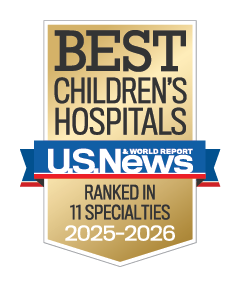

In this edition:
- Robotic-assisted laparoscopy improves outcomes in urology
- Child life specialists support pediatric anesthesiology
- New dental clinic for children with autism spectrum disorder
- Register for June 25 Pediatric Musculoskeletal Conference
Robotic surgery for pediatric urology: Rapid recovery, minimal scarring, optimal outcomes
Laparoscopic robotic-assisted surgery is becoming the norm in pediatric urology at UCSF Benio? Children’s Hospitals. The technique elevates minimally invasive surgery to a new level of precision and accuracy.
Robotic laparoscopy o?ers several bene?ts:
- Scarring and pain are reduced or eliminated, since small port sites are used for surgical access.
- Extreme precision is achieved with a three-dimensional surgical field that is magnified 30x?50x.
- Ease of manipulation of the robotic arm facilitates suturing and other fine-control maneuvers.
Sitting at a console ?tted out with robotic arms, surgeons carry out the most delicate of procedures without touching the patient. Most pediatric urology patients who undergo robotic surgery at UCSF Benio? Children’s Hospitals are infants, but the technique is used for patients of all ages.
For more information about robotic urological surgery, contact the Pediatric Urology team at (4?15) 35?3?22?00, visit our website here, or contact Laurence Baskin, MD
(laurence.baskin@ucsf.edu), or Hillary Copp, MD, MS (hillary.copp@ucsf.edu).
Pediatric anesthesiology relies on child life specialists to reduce preop stress for patients
At UCSF Benio? Children’s Hospitals, our operating rooms (ORs) and MRI suites are always sta?ed with board-certi?ed, pediatric-trained anesthesiologists who treat only children. These experts in pediatric anesthesiology often call on child life specialists to make the hospital experience easier and less frightening for patients. This is important not just before and during surgery, but to create positive memories for the child.
- Reducing stress and diminishing fear for the child results in a positive experience, which includes a sense of autonomy and mastery.
- This can provide a positive foundation for medical experiences throughout the child’s life.
- Relaxing the child can help avoid having to administer anesthesia before bringing the child to the OR.
Children with autism spectrum disorder get dental care at Star Smiles clinic
The Star Smiles Dental Clinic is a new program o?ered by UCSF Benio? Children’s Hospitals dedicated to taking care of children with autism spectrum disorder (ASD). The goal of the program is to help children with ASD build skills that enable them to do the following:
- Have dental visits cooperatively.
- Practice good oral hygiene at home.
The clinic sees children with ASD two afternoons a month, at the Parnassus dental clinic. Its intent is also to help avoid in-hospital, sedated dental care.
Run by dental faculty and residents, the Star Smiles Dental Clinic taps into the expertise of a behavioral therapist from the UCSF Department of Psychiatry and Behavioral Sciences’ Service, Training, Advocacy and Research (STAR) Center for Autism Spectrum Disorders and Neurodevelopmental Disorders. The therapist, who is a board-certi?ed behavioral analyst, uses desensitization and behavior modi?cation techniques with children with ASD and their families.
As many as three sessions with the behavioral therapist through a hybrid model of telehealth and in-person visits in the dental o?ce may be needed before the child is ready for an exam. Medicaid has recently added reimbursement for these services. Star Smiles is the only clinic in the region providing this type of care.
For more information about this program, contact Jean Calvo, DDS, MPH, at jean.calvo@ucsf.edu.
Register Now for the June 25 UCSF Pediatric Musculoskeletal Conference
The UCSF Department of Orthopaedic Surgery is pleased to announce the launch of a new continuing medical education conference: the UCSF Pediatric Musculoskeletal Conference for Primary Care Providers.
Developed by the Division of Pediatric Orthopaedics, this year’s virtual conference will be held on Friday, June 25, and will provide an overview of pediatric musculoskeletal conditions that are commonly encountered by primary care providers. Speci?c topics include scoliosis, hip dysplasia, lower-extremity conditions during growth and development, sports-related injuries and fracture care. To learn more, visit http://tiny.ucsf.edu/PedsMSK.



